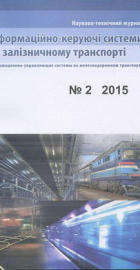Reviewing process
Editorial staff of the scientific and technical journal “information and control systems on railway transport” keeps within the ethical norms, adopted by the international scientific community. It corresponds to the journal policy and is one of the main constituent parts of reviewing and publishing the journal.
The reviewing is conducted confidentially according to the principle of double-blind reviewing (neither the author nor the reviewer know each other). The interaction between the author and the reviewers is conducted via the executive editor of the journal. Following the request of the reader and by agreement with the working party of the editorial board, the interaction of the author and the reviewer may take place in the open mode (such decision is taken only on the case when open interaction will allow improving the style and the logics of covering the material).
Reviewers of scientific materials are assigned by the Editor-in-chief. The reviewing has two main functions to improve the quality of scientific research:
- To determine authenticity and singularity of the article;
- To suggest the ways as to the improvement of publications.
Reviews of scientific articles must be objective and personal critics of the author in a scientific article is unacceptable. Reviewers must express their points of view clearly and in a well-argued manner.
After the final analysis of the article, a reviewer fills in a standard Review form which contains final recommendations. The editors inform the author about the results of reviewing by email.
If the reviewer indicates the necessity to make some corrections in the article, it is sent to the author with the proposal to take the comments into account while preparing the renewed variant of the article or refute them in a well-argued manner.
If the author does not agree with the reviewer’s opinion the author has the right to send a reasoned response to the editors of the journal. In this case the article is considered at the meeting of a working group of the editorial staff. The editorial staff can send the article to another specialist for additional or new reviewing. The editorial staff reserves the right to reject the article in case of the author’s incapability or unwillingness to take into account reviewers’ remarks.
Attached files



